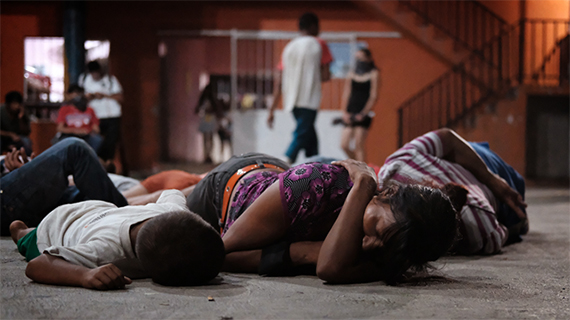
LA 72 held this commemoration of the mass murder of 72 migrants by the Los Zetas drug cartel in San Fernando, Mexico, in 2010. Photo courtesy Giorgio Algeri
By Giorgio Algeri, 2010-11 Rotary Peace Fellow, University of Queensland, Australia
On a late evening in August, a family of eight migrant persons from Honduras arrived at the refugee shelter where I was serving as a short-term volunteer in Tabasco, Mexico, near the border with Guatemala. The family of three adults and five children, most below the age of 10, had fled their country for security reasons and were renting a tiny room in Tabasco awaiting asylum. The son of the landlord came home drunk and threatened the family with a machete, forcing them to leave all their belongings behind.
Luckily, nobody was injured. Yet, they were still shivering and crying when I welcomed them at the shelter, a safe haven where immigration authorities, federal and local police officers, and scoundrels are not allowed to enter. To calm them down, I highlighted the safety and hospitality of the place before addressing any basic needs such as clothing and personal hygiene kits.
Racism and xenophobia
As a humanitarian and development worker over the past 10 years, I have seen the desperation of those in need in a variety of settings including post-conflict countries like the Democratic Republic of Congo and the Central African Republic. The accounts of the migrants and refugees from the so-called Northern Triangle of Central America (El Salvador, Honduras, and Guatemala) and the violence they suffered in their country of origin reminded me of similar horrific stories from migrants and refugees traveling along the Libyan migration corridor from Africa to Italy to Europe.
States themselves are ultimately responsible for preventing xenophobic and racist acts that threaten the lives of economic migrants, refugees, asylum seekers, and other vulnerable groups. Nowadays, however, an increasing departure from the values of humanity and solidarity is increasingly leading to a rise of violence, discrimination, and human rights violations against these vulnerable groups.
A clear example is the emerging migration crisis in the Mediterranean Sea and the recent tension between Spain, Malta, and Italy over the fate of 630 migrants and refugees that remained stranded between Sicily and Malta for about a week.
Worsening human rights
The decision by the Italian Government to deny NGO ship access to Italy’s ports or not take in migrants and refugees rescued off the coast of Libya denotes an alarming worsening of the human rights situation in Italy. It further represented a violation of international humanitarian law for the repatriation of vulnerable migrants to Libya, a war-torn country in North Africa. Propaganda and anti-migrant alliances are creating a climate of hate and violence against migrants and refugees across Europe.
The one thing most vulnerable migrants and refugees have in common is a desire to live safely with dignity. Existing initiatives and programs such as the above shelter play a crucial role and provide a safe pathway for such vulnerable groups. But everyone has a responsibility to promote acceptance of the rights of others (one of the key pillars used by the Institute for Economics and Peace to measure peace).
You don’t need to be a humanitarian worker to make a difference. Anyone can contribute by raising funds, holding an event to commemorate the rights of refugees, or taking part in social media campaigns. You can also volunteer in service projects that promote a culture of positive peace and create a more constructive dialogue between migrants, refugees, and host communities. It’s time to stand up for the human rights of migrants and take action now.
About the author: Giorgio Algeri is a former Rotary Peace Fellow with a Master’s Degree in Asian Studies from Lund University, Sweden and a Master of International Studies in Peace and Conflict Resolution from the University of Queensland, Australia (2010-2011). He has been working with Non-Governmental Organizations (NGOs) and the United Nations in about 10 countries across Africa, Asia and the Middle East.